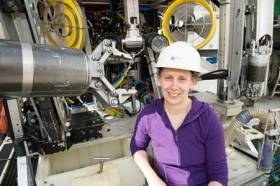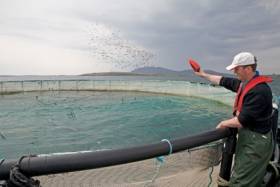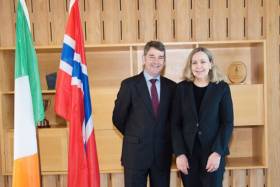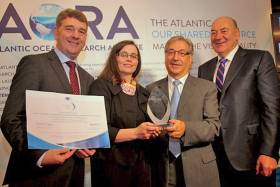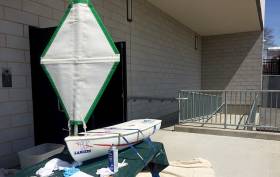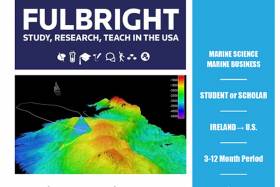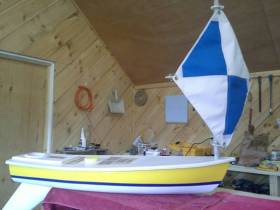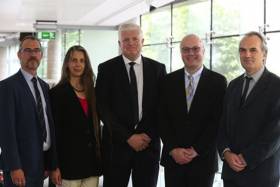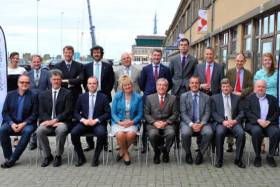Displaying items by tag: research
#MarineScience - Marine scientist and researcher Dr Louise Allcock from NUI Galway is leading a team of 10 university researchers and students on a two-week deep-sea expedition researching cold water corals and sponges.
The team — who can be followed on the Scientists@Sea blog – are currently exploring the Whittard Canyon, located 200 nautical miles south-west of Ireland at the edge of the continental shelf in the Atlantic Ocean aboard the Marine Institute’s RV Celtic Explorer, which recently returned from a climate change ‘health check’ of the Atlantic.
And the researchers are making extensive use of the Marine Institute’s ROV Holland I, deployed into areas where the sea floor rapidly drops from around 300m down to 3,000m.
“The researchers and students are seeing for the first time corals and sponges covering an area around the Whittard Canyon, Porcupine Seabight, Gollum Channel and the Belgica Mounds in Irish waters,” said Dr Olivier Thomas, a professor of marine biodiscovery at NUI Galway and co-ordinator of the National Marine Biodiscovery Laboratory located at the Marine Institute.
Dr Allcock added: “Using the ROV’s robotic and lighting capabilities, we are able to manoeuvre the Holland I, which is comparable to the size of a mini-van, through the water, and use its arms and clasps, which are like hands, to take small samples of corals, sponges and other specimens from extremely hostile parts of the ocean floor where there is no natural light and tremendous ocean pressure.”
By analysing past research relating to sponges and corals, Dr Allcock explained that her team “are able to see that some species are better target groups than others in having antimicrobial or anti-cancer properties.
“Based on this information we are building mathematical models to predict the likelihood of any given species yielding a novel natural product, along with developing species distribution maps of corals and sponges on the deep-sea floor, so that we know the best places to go searching.”
When the research team returns from sea, they work with the national marine biodiscovery lab at the Marine Institute. The chemists at NUI Galway extract the chemical compounds from all of the samples of sponges and corals to see if they have drug-like characteristics such as anti-cancer or antimicrobial properties that can be used for novel drugs to combat human illnesses.
“Chemists involved in biodiscovery research only need small quantities of any organism to develop a new drug, because once a suitable compound is identified, it can be synthesised in the lab, which can then be used in drugs to combat human diseases,” said Dr Thomas.
The ROV Holland I provides high definition continuous video footage of the deep seafloor as it is being used to collect samples.
“Going back through footage after the expedition enables us to further analyse the location recording of all the corals and sponges,” said Dr Allcock. “This improves future predictions of where else we might find similar specimens and also allows us to provide data to inform conservation policy so that we make sure that important ‘hotspots’ rich in corals and sponges are preserved.”
Marine Institute chief executive Dr Peter Heffernan was enthusiastic about the mission’s prospects.
“These are exciting times to be a marine researcher as marine scientists around the world have discovered more species in the ocean in the last ten years than ever before, with an average of 2,000 new discoveries each year,” he said.
“In Ireland we are contributing to building on this wealth of valuable information and sharing the best available science and knowledge to inform decisions affecting the Atlantic Ocean.”
This survey is being undertaken as part of a five-year project on ‘Exploiting and conserving deep-sea genetic resources’ at NUI Galway, co-funded by the Science Foundation Ireland and Marine Institute.
The National Marine Biodiscovery Laboratory project brings together six of the country’s leading marine researchers across a range of disciplines from NUI Galway, University of Limerick and University College Cork to study how marine substances might in future be used to make ingredients for cosmetics, pharmaceuticals and functional foods.
#MarineScience - A new marine research cluster is planned for Connemara incorporating the Údaras na Gaeltachta facility at Pairc na Mara currently under development in Cill Chiaráin, NUI Galway’s Carna Campus Laboratories, and an aquaculture site in Beirtreach Buí near Carna.
The Connemara cluster will form part of a national aquaculture research cluster which includes the Marine Institute facilities at Newport, Co Mayo, with the Beirtreach Buí site touted as “an important part of the State’s marine research infrastructure”.
In 2016, the Marine Institute secured EU Horizon 2020 and Science Foundation Ireland funding for a range of research projects that will be carried out in close collaboration with Marine Institute teams in Newport and Galway as well as researchers at the NUI Galway campus in Carna and the Udaras na Gaeltachta facility at Páirc na Mara.
These research projects will include studies on cleaner fish, which are used to control sea lice and other external parasites; animal welfare; and poly culture of shellfish, fin fish and seaweeds to enhance biodiversity and reduce environmental impacts.
The Marine Institute says it has committed funding to create three jobs to run and maintain the Beirtreach Buí aquaculture research site and provide support to marine research teams and projects.
The Beirtreach Buí site is expected to support a number of research projects in the coming years, including the development of integrated multi-trophic aquaculture, which provides the by-products, including waste, from one aquatic species as inputs (fertilizers, food) for another. This research will be in association with project partners in both Irish third-level institutions and partners from other EU states.
The site will also be used to support a major international project TAPAS, which has received €7 million from the EU under Horizon 2020.
The TAPAS project aims to develop cost-efficient management tools and practices for the European aquaculture sector to investigate the limits to fish farming activity in a location, social interactions, potential environmental impacts and any future risks.
The Marine Institute has applied to the Department of Agriculture, Food and the Marine to amend the licence for the aquaculture site at Beirtreach Buí from a commercial to a research license.
This application to amend the aquaculture licence at Beirtreach Buí will involve a reduction in the size of the site, a decrease in the number of licensed structures, from 48 structures to a maximum of 12 cages and 12 smaller structures made up of a combination of long lines and sentinel cages/passive sampling structures.
The amendment also includes a reduction in the level of fish stock at the site from the current level of 100 tonnes to a maximum of 50 tonnes. The amended license will allow for holding a range of fish, shellfish and seaweed species for research purposes. No commercial production will be licensed at the site.
The site was originally used for farming salmon in the 1980s and, in 2010, the aquaculture licence was amended in order to carry out culture trials on cod in collaboration with NUI Galway and Údaras na Gaeltachta.
In 2013 the site was taken over by the Marine Institute to focus on research work on cod and related studies, including research into natural alternatives for antifouling.
The new research licence application will go to public consultation this week.
Marine Institute Hosts Norwegian Ambassador’s Galway Visit
#Research - A recent visit to the Marine Institute by the Norwegian Ambassador to Ireland Else Berit Eikeland was an opportunity to discuss marine research collaborations with a North Atlantic partner.
That’s according to Marine Institute chief executive Dr Peter Heffernan, who added: "The essential role of international cooperation in developing our knowledge of the Atlantic and North Atlantic Ocean and its dynamic systems is necessary, particularly in a time when we need to adapt to climate and environmental changes taking place around the world.
"Aligning our research efforts in areas such as fisheries ecosystem management; marine environment and food safety in aquaculture and shellfish; as well as oceanographic digital research, provides us with future partnerships that can benefit and improve ocean health and stewardship as well as promote the sustainable management of our ocean resources.”
The Marine Institute hosted the visit of Her Excellency Else Berit Eikeland, Ambassador of the Royal Norwegian Embassy to Galway, where she met executive management at its headquarters in Rinville, Oranmore last Thursday 23 February.
Inland Fisheries Ireland Recruiting Temporary Research Staff
#Jobs - Inland Fisheries Ireland’s R&D division has secured external funding to undertake a series of research projects, which are currently seeking to recruit a number of staff as research technicians and fisheries assistants.
Interviews will take place in mid to late March to fill a number of positions for periods of up to a maximum of 10 months’ duration during 2017, and a panel for subsequent positions will be compiled following interview.
All positions will be based at the current IFI head office in Dublin’s Citywest Business Campus.
Research Technician
The appointee will provide technical support to the Senior Research Officer (SRO) and project team in the compilation and analysis of data of relevant biotic and abiotic information for fish species in Irish lakes, rivers or estuaries, using standard fish sampling methodologies.
Principal duties and responsibilities include:
- Data collection: Carry out and lead field surveys when necessary, collect data on the abundance, composition and age structure of fish populations from designated waterbodies, collect data on the distribution, biology and ecology of fish species in designated waterbodies.
- Data analysis: Collate and input data into project databases and present data in report format as required, data mining, conduct statistical analyses (descriptive and analytical) of data sets, including using relevant statistical software, manage fisheries datasets for the project, assure quality of data including editing and verification of consistency, create tables, charts and graphics with narrative text, interpret data, analyse and prepare reports.
- Reporting: Maintain raw data and all other records in a clear concise format and compile and maintain all records in a manner compatible with GIS.
- Other duties: Liaise with the project team and stakeholders and attend/contribute to information meetings as required, liaise with other IFI staff working on related projects as required.
Requirements for this position include a relevant diploma or degree or equivalent, and a full driving licence valid in the State. Salary is at the first point of the technician scale (as at 1 January 2016): €32,231 to €51,717 (including 1 LSI).
Fisheries Assistant
The appointee or appointees will assist the Senior Research officer and team in the compilation and analysis of relevant biotic and abiotic information for fish species in Irish lakes, rivers or estuaries, using standard fish sampling methodologies.
The successful candidate or candidates will be expected to:
- Assist on field surveys (if necessary).
- Undertake processing of sample material and providing assistance to the SRO with sample analysis.
- Assist in the processing of fish samples, collate scale, otolith and opercular bone samples to provide information on age profile and growth rates of fish species, and input data into IFI databases.
- Maintain raw data and all other records in a clear concise format.
- Compile and maintain all records in a manner compatible with GIS.
- Liaise with other IFI staff working on related projects as required.
Requirements for this position include a Leaving Certificate or equivalent with minimum Grade C on at least two Higher Level papers, to include one of Biology, Chemistry, Physics, Geography or Maths, and a full driving licence valid in the State. Salary is at the first point of the fisheries officer/fisheries assistant scale (as at 1 January 16): €22,907 to €36,235 (including 2 LSI’s).
Applications, (a cover letter and up-to-date CV) should be sent to [email protected] by 5pm on Friday 3 March. Please quote either ‘Fish’ for Fisheries Assistant roles or ‘Tech’ for the Technician role,s depending on which you wish to apply for. Late applications will not be processed.
Short listing will be based on information provide in the cover letter and CV. Canvassing will disqualify. Inland Fisheries Ireland is an equal opportunities employer. All enquiries to [email protected].
Atlantic Ocean Research Alliance Project Wins International Award
#MarineScience - The Atlantic Ocean Research Alliance Co-ordination and Support Action (AORA-CSA) has received the first Atlantic Project Award for International Cooperation.
The Marine Institute-led project was presented with the accolade yesterday (Tuesday 27 September) during the Atlantic Stakeholders Conference at the Croke Park Conference Centre.
Karmenu Vella, European Commissioner for Environment, Maritime Affairs and Fisheries, presented the award to Dr Peter Heffernan and Dr Margaret Rae of the Marine Institute, the lead partner in the Horizon 2020-funded project to implement the Galway Statement on Atlantic Ocean co-operation and support the emerging blue economy.
Marine Minister Michael Creed highlighted the importance of the Atlantic Strategy to Ireland in his address to the conference, which aims to promote entrepreneurship and innovation as a hub for participants to make valuable contacts and explore areas for co-operation, share information and good practices, promote and identify new ideas as well as funding opportunities and partnerships for their projects.
"Just over half of the 400-plus delegates at the conference today are Irish, many of them SMEs, which shows the importance of the Atlantic Strategy to Ireland and the significant opportunities it represents,” said Dr Heffernan, the Marine Institute’s chief executive.
“Irish SMEs have the chance to meet face to face with potential research partners and investors, and to work together on ideas for novel marine projects at the networking and matchmaking activities here today.”
The Atlantic Strategy has influence on the European Union’s innovation and funding programmes, including the Horizon 2020 framework programme for research, the European Maritime and Fisheries Fund (EMFF) and the InterReg programme.
"Irish marine researchers have been very successful in winning blue growth research funding, with 5% of the available budget under Horizon 2020 in 2014 going to Irish researchers,” said Dr Heffernan. “Irish marine research projects benefitted from €5.6m funding and resulted in the creation of about 41 research jobs.
"Irish researchers had an equally strong performance in 2015, winning €2.86m in competitive funding, representing 4.7% of the total EU budget in this area."
Seven Irish research organisations were funded under the 2015 calls, with NUI Galway winning nearly €1m for a number of marine research projects.
Another notable Irish success was Brandon Bioscience Ltd, funded under the SME instrument as partners in the SEA MORE YIELD project to commercialise a novel biotech solution to yield losses in oil seed crops using native Irish seaweed.
The Atlantic Strategy Group, which oversees the implementation of the EU's Atlantic Strategy, is currently chaired by Ireland and made up of relevant member states (Ireland, UK, France, Portugal, and Spain), the European Parliament and the European Commission, as well as regional representatives.
Unmanned Mini Yacht Found In Connemara After Search Appeal
#Unmanned - Following our previous alert for an unmanned yacht off the Galway coast, the mini-yacht has been found after making landfall.
Kaitlyn Dow's self-built vessel Lancer was launched off the US coast four months ago as part of a high-school marine science project.
The now final-year student at Waterford High School in Connecticut tracked her sailboat by GPS across the Atlantic as it inched towards Galway Bay and Connemara.
It was finally recovered this past Saturday 17 September by eight-year-old Maedhbh Ní Ghionnáin on an island near her home in Lettermore, as The Day reports.
After her aunt received an email from Dow asking for any details of her boat's whereabouts, Maedhbh's family had been keeping a lookout before they found it on a beach virtually on their doorstep.
“In the middle of the day we went walking by the sea, and then we saw this white thing,” said Maedhbh, who also shared the story of her remarkable discovery with Raidió na Gaeltachta.
The news comes a month after another unmanned research sailboat was reported off the Kerry coast after nearly three years in the North Atlantic.
Applications Open To Marine Researchers For Fulbright-Marine Institute Award
#MarineScience - The Fulbright Commission and the Marine Institute are offering a unique opportunity for an Irish PhD candidate or scholar to travel to the US to research in the fields of marine science or marine-related business sector.
The commission is particularly interested in receiving applications for this award from candidates who are exploring:
- Marine Sensor Technologies and Observation Systems
- Maritime Economics
- Marine Spatial Planning, Maritime Law and Security
- Renewable Ocean Energy
- Marine Biotechnology (including Functional Foods)
- Marine Environment
- Oceanographic Modelling
- Shipping, Seafood Safety, and
- Ecosystems-based Fisheries Management
Fulbright Irish Awards offer funding and administrative support for Irish citizens and EU citizens (resident in Ireland for more than three years) to study, research or teach/lecture in the USA for a period of four months or one semester, up to one year.
The application period is now open with a deadline is 4pm on Friday 28 October.
Details of the 2017-2018 Fulbright-Marine Institute Award to conduct postgraduate research in the US in all fields of marine science or marine-related business sector are available at the Marine Institute website HERE.
Fulbright staff will hold a webinar giving general information on the Fulbright Irish Awards at 1pm next Tuesday 13 September – email [email protected] if you would like to register.
Fulbright award managers can be reached on 01 660 7670 or at [email protected] to answer application queries. Fulbright Ireland ambassadors are also available to give on-campus support.
Unmanned Research Boat Spotted Off Kerry Coast
#Unmanned - A miniature unmanned sailing boat has been reported off the Kerry coast after nearly three years in the North Atlantic.
The boat, named West, is part of the Educational Passages project by the Middle School of Westbrook in Maine, USA and is one of five boats the Sebago School Alliance sent out in the autumn and winter of 2013-14.
West was launched off Georges Bank along with one other boat by Bro Cote, a lobsterman out of Hyannis, Massachusetts. Several others were launched about the same time off the Mid-East coast of the United States and off the Canary Islands for the marine science project.
“We had hoped the boat would make the complete circle of the Atlantic Ocean. It has and then some,” say the project organsiers about West, which has been spotted 32 nautical miles from the Kerry coastline.
West could arrive in the Kerry area over the next few days or, depending upon weather conditions, may go further northwards towards the Galway coast.
Previously West made landfall in November 2014 when it crashed on rocks in rough seas off Portugal, where it was recovered by local authorities and repaired with the help of local companies and relaunched from Lisbon in June last year.
Four months later, it was recovered entering the Mediterranean, refurbished again and put on a cargo ship to Madeira and relaunched from there on 28 January this year.
The project co-ordinators have asked for assistance to help rescue the boat when it arrives in the coming days
“It would be great if the boat could be recovered at sea or shortly after landing to avoid damage."
Researchers At NUIG & UCC Win SFI-Marine Institute Funding
#MarineScience - Two marine science projects will be funded as part of €40 million in research funding for 24 major projects as announced yesterday (Wednesday 3 August) by Minister for Innovation Mary Mitchell-O'Connor.
Distributed via the Science Foundation Ireland's Investigators Programme, the investment supports world-class research in key priority areas for Ireland, with co-funding for seven of the projects provided by the Department for the Economy, Northern Ireland; the Geological Survey of Ireland; the Environmental Protection Agency; and the Marine Institute, which is co-funding two key research projects as part of the programme.
Dr Louise Allcock of NUI Galway has been awarded €1,940,000 to investigate deep sea corals and sponges to identify novel natural products in Ireland's offshore waters and increase knowledge of their economic value and distribution.
Dr Allcock also aims to produce predictive maps of biodiscovery potential to maximise the economic impact of future biodiscovery work.
Meanwhile, Dr Philip McGinnity of University College Cork has been awarded €1,709,500 to investigate interactions between wild and farmed salmon, and aims to develop a predictive methodology to inform environmental best practice to secure long-term sustainability of global wild and farm fish populations.
With awards ranging from €500,000 to €2.7 million over four- to five-year periods, projects funded by the Investigators Programme will support more than 200 researchers overall.
"This funding provides an important platform for researchers to advance their investigations and further enhance Ireland's reputation for excellence in sectors such as health, agriculture, marine, energy and technology," said Minister Mitchell-O'Connor.
"Engaging with 39 companies, the programme offers researchers the opportunity to develop their careers, as well as providing industry collaborators with access to the wealth of outstanding expertise and infrastructure found throughout the island.
The minister added: "The alignment of the Investigators Programme with Horizon 2020, the European Union's research funding programme, will lead to further successes in leveraging EU resources and increasing international collaboration.
"The projects within this programme clearly demonstrate excellent and impactful research which is a key goal of the Government's science and innovation strategy, Innovation 2020."
Dr Ciaran Kelly, marine research and development manager at the Marine Institute, said: "We're delighted to partner with Science Foundation Ireland to co-fund this important research to build capacity in key areas such as deep sea biodiscovery, and aquaculture and genetics.
"These research projects will help to maximise the benefits of our ocean resources to society, while ensuring the long-term sustainability of these activities."
#MarineScience - Marine Institute chief executive Dr Peter Heffernan was among the heads of European marine science institutes meeting with Karmenu Vella, EU Commissioner for Environment, Maritime Affairs and Fisheries, at the European Marine Board offices in Ostend, Belgium yesterday (Friday 8 July) to discuss ocean research priorities and challenges.
The meeting with Commissioner Vella follows a previous consultation attended by Dr Heffernan in March, which identified ocean observation and seabed mapping as crucial for managing human activities in European seas and across the global ocean.
The European Marine Board said the latest meeting will advance the discussion on ocean observing and seabed mapping in Europe, set within a global context, by identifying critical gaps in our capability, investment needs and potential funding sources for the future.
“Ocean observation and seabed mapping are essential for managing human activities in the ocean," said Dr Heffernan. "With better observation and prediction capability, we can de-risk investment; we can have well informed licensing and regulation for sustainable economic developments; and we can protect ocean ecosystems and the essential services they provide, like food, medicine, and providing half of the oxygen we breathe.”
The Marine Institute CEO added: “Ireland has much to contribute to these consultations as we have significant seabed mapping expertise through INFOMAR, the national seabed mapping programme led by the Geological Survey of Ireland and the Marine Institute.
"And we are developing key ocean observation and marine research infrastructure in Ireland to advance our understanding of the ocean and to underpin innovation in the ocean."
Mapping, observing and predicting changes in the ocean were the focus of discussion at the Our Ocean Wealth conference in Galway last week, at which Ireland’s first ocean observatory was officially launched.
The meeting with Commissioner Vella in Ostend marks the second in a series and is an important platform for the ocean research community to communicate directly with the commissioner on ocean research issues.


























